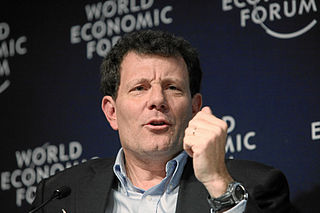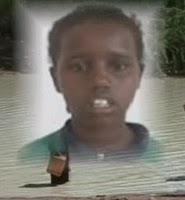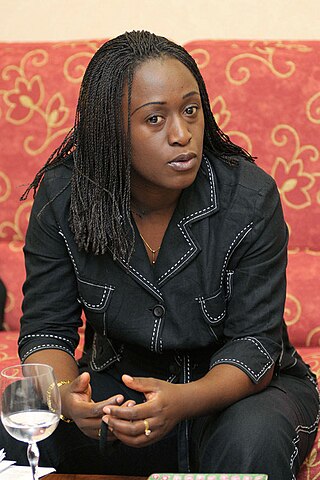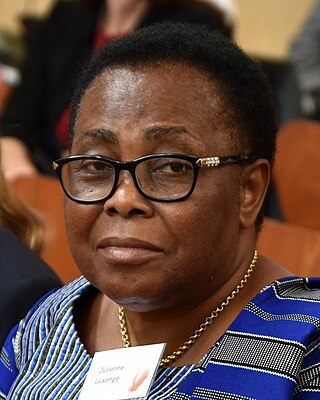
Nicholas Donabet Kristof is an American journalist and political commentator. A winner of two Pulitzer Prizes, he is a regular CNN contributor and an op-ed columnist for The New York Times.

Mukhtaran Bibi, now known as Mukhtār Mā'ī, is a Pakistani human rights activist from the village of Meerwala, located in the rural tehsil of Jatoi in the Muzaffargarh District of Punjab, Pakistan. In June 2002, Mā'ī was the victim of a gang-rape sanctioned by a tribal council of the local Mastoi Baloch clan, as a form of 'honour revenge'; the council ruling was a result of a dispute between the wealthier Mastoi Baloch and Mā'ī's Tatla clan.

Human rights in Somalia throughout the late 20th-century and early 21st-century were considered dire, but have gradually improved over the following years. Human rights are guaranteed in the Federal Constitution, which was adopted in August 2012. They fall under the Ministry of Human Rights established in August 2013. The central authorities concurrently inaugurated a National Human Rights Day, endorsed an official Human Rights Roadmap, and completed Somalia's first National Gender Policy.

Denis Mukwege is a Congolese gynecologist and Pentecostal pastor. He founded and works in Panzi Hospital in Bukavu, where he specializes in the treatment of women who have been raped by armed rebels. In 2018, Mukwege and Iraqi Yazidi human rights activist Nadia Murad were jointly awarded the Nobel Peace Prize for "their efforts to end the use of sexual violence as a weapon of war and armed conflict".

The Democratic Republic of the Congo, and the east of the country in particular, has been described as the "Rape Capital of the World", and the prevalence and intensity of all forms of sexual violence has been described as the worst in the world. Human Rights Watch defines sexual violence as "an act of a sexual nature by force, or by threat of force or coercion", and rape as "a form of sexual violence during which the body of a person is invaded, resulting in penetration, however slight, of any part of the body of the victim, with a sexual organ, or of the anal or genital opening of the victim with any object or other part of the body."

Half the Sky: Turning Oppression into Opportunity for Women Worldwide is a nonfiction book by husband and wife team Nicholas Kristof and Sheryl WuDunn published by Knopf in September 2009. The book argues that the oppression of women worldwide is "the paramount moral challenge" of the present era, much as the fight against slavery was in the past. The title comes from the 1968 statement by Mao Zedong "妇女能顶半边天", meaning "women hold up half the sky", though the authors cite it only as a "Chinese proverb".

The Eastern Congo Initiative (ECI) is an American nonprofit organization established by Ben Affleck and Whitney Williams in 2010 as "the first U.S.-based advocacy and grant-making initiative wholly focused on working with and for the people of eastern Congo". ECI provides development grants and international advocacy for community-building initiatives in the Democratic Republic of Congo.
Tererai Trent is a Zimbabwean-American woman whose unlikely educational success has brought her international fame.
The Democratic Republic of the Congo is a country located in central Africa.
The Democratic Republic of the Congo (DRC) ratified the 2000 UN TIP Protocol in October 2005.

The stoning of Aisha Ibrahim Duhulow was a public execution carried out by the Al-Shabaab militant group on 27 October 2008 in the southern port town of Kismayo, Somalia. Duhulow's father and aunt stated that she was a 13-year-old girl and that she had been arrested and stoned to death after trying to report that she had been raped. Initial reports had stated that Duhulow was a 23-year-old woman found guilty of adultery; she was, however, under the age of marriage eligibility. The execution took place in a public stadium attended by about 1,000 bystanders, several of whom attempted to intervene but were shot by the militants.

Fartuun Abdisalaan Adan is a Somali social activist. She is the executive director of the Elman Peace and Human Rights Centre.

Ilwad Elman is a Somali-Canadian social activist. She works at the Elman Peace and Human Rights Center in Mogadishu alongside her mother Fartuun Adan, the NGO's founder. She was voted the African Young Personality (Female) of the Year during the 2016 Africa Youth Awards.
The Elman Peace and Human Rights Center is a non-governmental organization based in Mogadishu, Somalia. It was established by Fartuun Adan in honour of her late husband Elman Ali Ahmed, a local entrepreneur and peace activist. Adan serves as the NGO's Executive Director, while their daughter Ilwad works alongside her. The organization was founded in 1990 and is dedicated to promoting peace, cultivating leadership and empowering the marginalized brackets of society to be decision makers in the processes that ensure their well-being.

Caddy Adzuba is a Congolese lawyer, journalist, and activist for women's rights. Her focus is on fighting sexual violence in the Democratic Republic of the Congo (DRC). She worked for Radio Okapi and in 2014 she received the Princess Asturias Award for Peace.
Solange Lwashiga Furaha is a human and women's rights activist from the Democratic Republic of the Congo, and the executive secretary of the South Kivu Congolese Women's Caucus for Peace.

Julienne Lusenge is a Congolese human rights activist recognized for advocating for survivors of wartime sexual violence. She is co-founder and President of Female Solidarity for Integrated Peace and Development (SOFEPADI) and director of the Congolese Women's Fund (FFC).

The 2018 Nobel Peace Prize was awarded to Denis Mukwege and Nadia Murad "for their efforts to end the use of sexual violence as a weapon of war and armed conflict," according to the Norwegian Nobel Committee announcement on 5 October 2018 in Oslo, Norway. "Both laureates have made a crucial contribution to focusing attention on, and combating, such war crimes," according to the award citation. After reading the citation, Committee Chair Berit Reiss-Andersen told reporters that the impact of this year's award is to highlight sexual abuse with the goal that every level of governance take responsibility to end such crimes and impunities.
Almaas Elman was a Somali-Canadian humanitarian aid worker, the eldest daughter of a prominent family of humanitarian aid-workers. Her parents were Elman Ali Ahmed and Fartuun Adan. She, her mother and her sisters emigrated to Canada in the early 1990s. Her father was gunned down in 1996. Her mother helped found the Elman Peace Center. One of her sisters Ilwad Elman was a short-listed candidate for the 2019 Nobel Peace Prize. Her husband, a Somali-Swedish tech entrepreneur, was Zakaria Hersi. They married in 2017.
Iman Elman is a Somali-Canadian military officer. When she was a child, Elman's parents were peace advocates in wartorn Somalia. When the dangers of working in Somalia increased her parents agreed that her father, Elman Ali Ahmed would stay in Somalia, and continue to work for Peace, while her mother, Fartuun Adan would raise their daughters in Canada. When her daughters reached adult-hood Fartuun returned to Somalia, to renew her work for Peace. Iman's elder sisters, Almaas Elman and Ilwad Elman, also returned to Somalia, followed by Iman herself.













